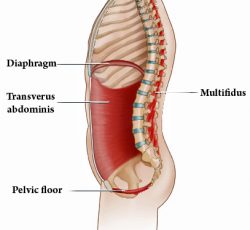There has been some controversy in the media surrounding the pre and post-natal exercise regimes that have gained popularity by promoting bikini bodies. So the biggest question seems to be:
Is it good for a woman’s mental health to be so focussed on appearance, shouldn’t we emphasise health instead of appearance?
As a fellow Personal Trainer, with almost 10 years in the industry, and also as a mum of 2, here’s my thoughts on this debate.
 Body Image
Body Image
There is already so much pressure in society for women to look a certain way, we are constantly judging ourselves and others based on appearance. Sadly, one out of every two Australian women report they feel worse about themselves after looking at images of attractive women in magazines. This is now being perpetuated by the fitness industry, when promoting a ‘bikini body’ and bombarding women with images of mums with their perfect body in a bikini, it creates unrealistic expectations on what to expect, and puts pressure on already stressed new mums to match up to this standard.
According to studies, only 20% of Australian women report having high body confidence. Most of us blame “unrealistic standards” set by media and advertising as one of the biggest problems. It’s just not reasonable for every woman in the world to look the same, and that shouldn’t be our goal. When you are recovering from the huge ordeal of pregnancy and childbirth, a much more holistic approach is to focus on health and wellness as the goal, and improved body image and composition will be one of the side-effects.
Questions to ask your post-natal fitness program provider
If you DO decide to participate in a post-natal fitness program, that’s great, and we certainly don’t want to discourage you from participating in something that will make you feel good about yourself. Just make sure the provider is thinking about your health and well-being as priority #1. If they can’t answer these questions you might want to look elsewhere.
- What will we do for my pelvic floor muscles?

The first step to getting back your body after pregnancy is strengthening your deep abdominal and pelvic floor muscles so you can regain your core strength and stability. Weakened pelvic floor is a VERY common issue for women post-delivery, and without proper rehabilitation it can cause life-long issues with incontinence and potential prolapse. High impact activities should be avoided until pelvic floor muscles have been trained and regained their strength – at least 12-16 weeks post natal.
- How will we protect my rectus abdominis muscle from further separation?
Another common issue during pregnancy is rectus abdominis diastasis – separation of the abdominal muscles, which left untreated can lead to chronic lower back pain and postural issues. Many traditional direct abdominal exercises like sit ups and leg raises, should be avoided completely as they can exacerbate the issue. After a few weeks of gently activating and strengthening the deep abdominal muscles you should start to feel stronger and more stable through your core and pelvis.
- How will my posture be corrected?
Another issue that is often neglected is the huge postural changes that occur with pregnancy. Anterior pelvic tilt, rounded shoulders and forward head posture are very common and are due to overly tight and shortened muscles in the chest, hip flexors and lower back, along with weakened and lengthened muscles in the abdomen, upper back and hip extensors. Intentional stretching of the tight muscles and strengthening of the weak muscles is crucial to help bring the body back into alignment and reduce chronic pain.
If you are only focussed on weight loss and the way you look, it can be easy to overlook these important health issues, which over time can have considerable negative impact on your health and wellbeing.
Final thoughts
While exercise is crucially important for all people, in every stage of life including post-natal, there is constant pressure for women to act and look a certain way. Women are being shamed and criticised for exercising too much and neglecting their baby, women are criticised for not exercising enough and neglecting their health. Women are judged for eating too much or not enough, or eating certain foods they shouldn’t. Women are judged if they focus too much on their appearance and not enough on their health. Enough already! Let’s stop with all the judgement and criticism, and focus on what’s important = Women’s physical and mental health.
- Eat a healthy, balanced diet.
- Exercise daily at a level suitable for you
- Focus on rehabilitating damaged areas first before moving on to advanced training
- Set a good example for your children by focussing on health rather than appearance
- Only talk positively about other people’s bodies and your own body
